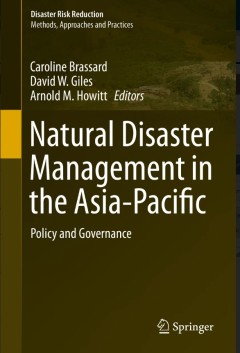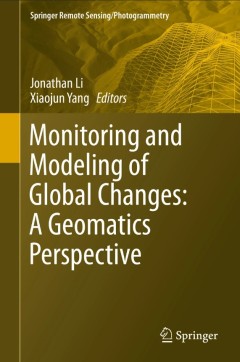Filter by

Empirical Economic and Financial Research Theory, Methods and Practice
The purpose of this book is to establish a connection between the traditional field of empirical economic research and the emerging area of empirical financial research and to build a bridge between theoretical developments in these areas and their application in practice. Accordingly, it covers broad topics in the theory and application of both empirical economic and financial research, includ…
- Edition
- -
- ISBN/ISSN
- 978-3-319-03122-4
- Collation
- 45 b/w illustrations, 27 illustrations in colour
- Series Title
- -
- Call Number
- -

Natural Disaster Management in the Asia-Pacific:Policy and Governance
The Asia-Pacific region is one of the most vulnerable to a variety of natural and manmade hazards. This edited book productively brings together scholars and senior public officials having direct experience in dealing with or researching on recent major natural disasters in the Asia-Pacific. The chapters focus on disaster preparedness and management, including pre-event planning and mitigation,…
- Edition
- 1
- ISBN/ISSN
- 978-4-431-55156-0
- Collation
- XXIV, 203
- Series Title
- -
- Call Number
- -

Morton Deutsch: Major Texts on Peace Psychology
Commemorating Morton Deutsch’s 95th birthday, this book presents ten major texts by this highly respected social psychologist on war and peace. This second volume presents Deutsch in his role as a leading social science activist on issues of war and peace – writing papers, making speeches and participating in demonstrations. After serving in the U.S. Air Force during World War II and being …
- Edition
- 1
- ISBN/ISSN
- 978-3-319-15442-8
- Collation
- XIII, 167
- Series Title
- SpringerBriefs on Pioneers in Science and Practice
- Call Number
- -

Morton Deutsch: A Pioneer in Developing Peace Psychology
Commemorating Morton Deutsch’s 95th birthday, this book presents ten major texts by this highly respected social psychologist on war and peace. This first volume presents Deutsch in his role as a leading social science activist on issues of war and peace – writing papers, making speeches and participating in demonstrations. After serving in the U.S. Air Force during World War II and being a…
- Edition
- 1
- ISBN/ISSN
- 978-3-319-15439-8
- Collation
- XVI, 139
- Series Title
- SpringerBriefs on Pioneers in Science and Practice
- Call Number
- -

Monitoring and Modeling of Global Changes: A Geomatics Perspective
The chapters in this book present state-of-the-art geomatics technologies applied in global environmental studies. This text provides the latest research findings and delivers complete references to related publications. This book will motivate the undergraduate and graduate students, researchers and practitioners to better understand the environmental changes with informed solutions. Global…
- Edition
- 1
- ISBN/ISSN
- 978-94-017-9812-9
- Collation
- XI, 320
- Series Title
- Springer Remote Sensing/Photogrammetry
- Call Number
- -

The Sustainability of Agro-Food and Natural Resource Systems in the Mediterra…
This book is focused on the challenges to implement sustainability in diverse contexts such as agribusiness, natural resource systems and new technologies. The experiences made by the researchers of the School of Agricultural, Forestry, Food and Environmental Science (SAFE) of the University of Basilicata offer a wide and multidisciplinary approach to the identification and testing of differ…
- Edition
- -
- ISBN/ISSN
- 978-3-319-16357-4
- Collation
- -
- Series Title
- -
- Call Number
- -

The Sugarcane Complex in Brazil The Role of Innovation in a Dynamic Sector o…
This book offers an in-depth analysis of the Brazilian sugarcane complex with a special focus on technological advances that promote sustainable development. It first examines the question why sugarcane-based ethanol from Brazil is considered a superior alternative to fossil fuel compared to other biofuels produced on an industrial scale and subsequently analyzes the most dynamic areas within t…
- Edition
- -
- ISBN/ISSN
- 978-3-319-16583-7
- Collation
- -
- Series Title
- -
- Call Number
- -

Emerging Issues in Sustainable Development International Trade Law and Polic…
This book seeks to answer the questions: how do the rules of international treaties on trade and investment apply to the new laws and policies relating to energy-related trade, and do the rules of the multilateral system contribute to or detract from sustainable development? An emerging set of new problems in the law of international trade is how to reconcile the rules of the multilateral trad…
- Edition
- -
- ISBN/ISSN
- 978-4-431-56426-3
- Collation
- 1 b/w illustrations, 2 illustrations in colour
- Series Title
- -
- Call Number
- -

The Smart City and the Co-creation of Value A Source of New Competitiveness …
The original point that differentiates this text from otherwise similar texts is that it looks at the building of smart cities from the viewpoint of an interchange of knowledge among companies in different industries, or “Ba” as shared context in motion, and emphasizes that the resulting value becomes a source of new corporate competitive advantage. In recent years numerous publications hav…
- Edition
- -
- ISBN/ISSN
- 978-4-431-55846-0
- Collation
- -
- Series Title
- -
- Call Number
- -

Modern Climate Change Science:An Overview of Today’s Climate Change Science
Composed of two extensive sections, this book surveys important work in climate change science, mainly in the United States, and introduces contributions to the body of science that have arrived on the scene between January 2013 and February 2014. The opening section offers a broad examination of contemporary climate change science, with subsections on the Intergovernmental Panel on Climate …
- Edition
- 1
- ISBN/ISSN
- 978-3-319-09221-8
- Collation
- XXV, 106
- Series Title
- SpringerBriefs in Environmental Science
- Call Number
- -
 Computer Science, Information & General Works
Computer Science, Information & General Works  Philosophy & Psychology
Philosophy & Psychology  Religion
Religion  Social Sciences
Social Sciences  Language
Language  Pure Science
Pure Science  Applied Sciences
Applied Sciences  Art & Recreation
Art & Recreation  Literature
Literature  History & Geography
History & Geography